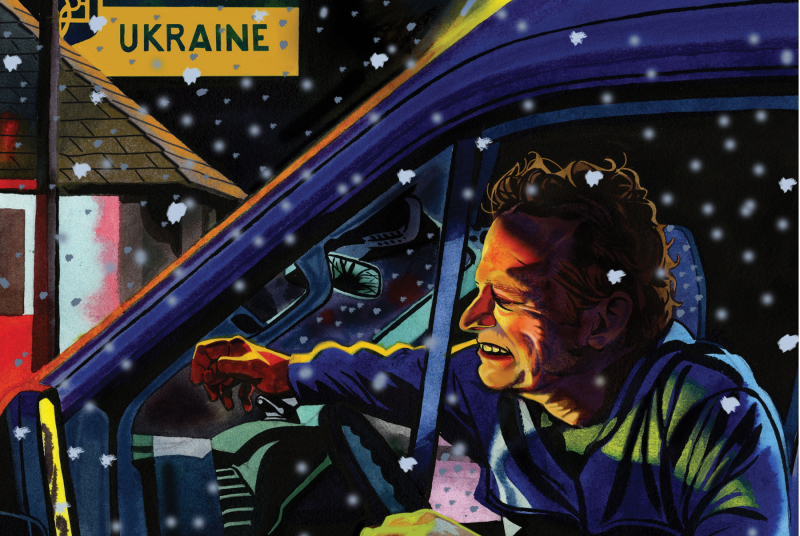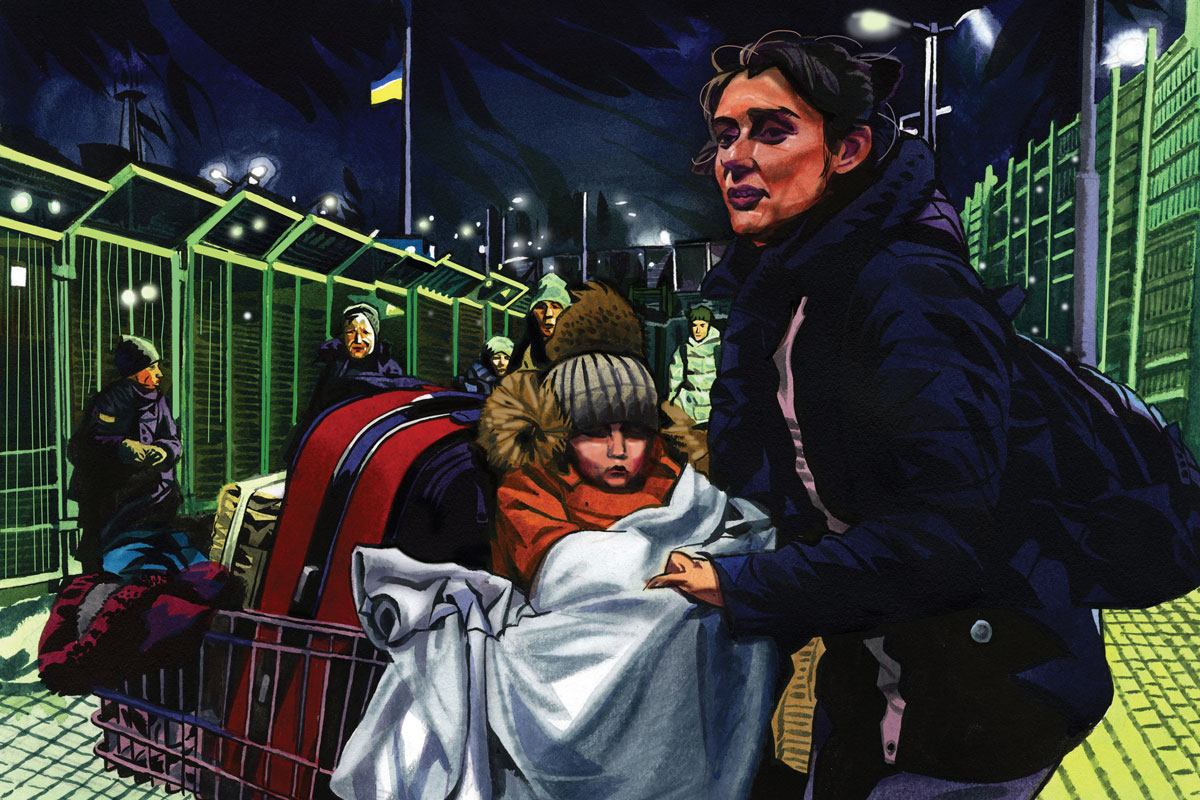
No Man’s Land
In late February, five days after Russian President Vladimir Putin’s troops invaded Ukraine, a half-dozen eight-ton trucks rolled up to the international border at Krościenko, Poland. They carried precious cargo: badly needed aid supplies for a newly invaded country and its citizens. The Polish drivers, many who chose not to provide their names, started to unload the goods into another set of trucks from Ukraine that had been waiting.
Once filled, this second set of trucks prepared to roll across a no man’s land and cross back into Ukraine. But border guards stopped them. Bad news. Just hours before, a new regulation had come down from on high: To enter Ukraine any driver now needed a passport in addition to a driver’s license. Suddenly, the crew didn’t have all the paperwork it needed to deliver its supplies and aid to soldiers and people in need.
“It was a nerve-wracking start,” says Dale Perry, who had hatched this complicated international convoy idea. “We were not sure what was safe and what was not.” As president of a Kyiv-based firm, Energy Resources of Ukraine, Perry knows how to coordinate massive shipments of liquefied natural gas to various points around the globe. Now he was attempting something seemingly out of a John Le Carré plot.
When the war first erupted, Perry had been traveling. A frustrated outsider looking in, Perry knew of the many refugees streaming out of Ukraine, but he became focused on the people remaining behind. Why not leverage his wealth, philanthropic bent, and influence to help his adopted country?
Back in no man’s land, the passport requirement presented a twist. Perry hadn’t been planning to drive any of the trucks—but he had a license and a passport. So the business exec jumped into a rig and steered toward Ukraine. During the next several hours, amid throngs of fleeing refugees and under the watchful eyes of heavily armed soldiers, Perry steered his way through three separate runs. When all was finished, the third set of vehicles set off to make deliveries to soldiers at the front lines and other Ukrainians in need.
“The guards called me the crazy American,” says Perry. Undeterred, he and his business partner, Yaroslav Mudryy, spent the next eight weeks overseeing the delivery of $3 million in aid to Ukraine. When soldiers sent back photos of smiling children next to boxes of diapers, baby formula, and baby food, Perry and Mudryy embraced. “We had the strongest and closest of hugs and actually started to cry, because at this point we knew people were eating,” says Perry.
After growing up in rural Coeur d’Alene, Idaho, Perry took his first flight when he was 17, to look at colleges. He decided on Dartmouth, where his interest in global affairs blossomed. He became a dual Russian and engineering major. His study abroad in Leningrad in 1982, during the Cold War, sparked a strong pro-West, anti-Soviet bent. He served in the U.S Navy from 1984 to 1989 as an officer on fast-attack nuclear-powered submarines. Later the CIA came knocking, but Perry wasn’t interested in the subterfuges of undercover life.
Perry’s career has mostly focused on private-sector turnarounds of state-owned power plants in former Soviet states to lessen their dependence on Moscow energy sources, including in Kazakhstan, where he moved in 1997 and lived on and off until 2008. In 2014, Perry founded his company, a 30-employee enterprise that focuses on reducing Ukraine’s reliance on Russian oil by importing gas from places such as Texas. He lives in Seattle when he’s not overseas.
When Russia invaded Ukraine on February 24, Perry was laying over in a hotel in Amsterdam, en route to Poland, where he was to welcome a tanker full of gas from the United States. Shocked that Russia had followed through on a longtime threat and certain that Ukraine would lay down its arms in a few days’ time, Perry initially thought about getting his employees out.
Half of them decided to stay put.
“For a while I was kind of mad that they didn’t want to leave,” he admits. “But [if something similar happened here] would I leave Seattle? And go to where, Canada? And do what?”
So he focused more on relief than rescue. On February 26, he huddled with Willem Coppoolse, a Dutch coworker, in his Amsterdam hotel’s restaurant and sketched out a plan that resulted in the truck convoy to the border. They booked a flight to Krakow, near the Ukrainian border, for the next morning. Perry purchased a sweater from a nearby consignment shop and thick socks from a dollar store, because he had only summer clothes and business suits in his luggage. He left those bags at the front desk.
“The concierge asked me, ‘When are you coming back?’ ” Perry recalls. “I said, ‘I don’t know. Ask Putin.’ ”
In Krakow the pair met up with Mudryy’s wife, who had driven out of Ukraine as the invasion began with $1 million in cash her husband had withdrawn from a company account. They assumed that guards along the way would demand bribes. Perry began searching for a medical supply company, knowing that aspirin, sterilization supplies, and first-aid kits were a top priority for doctors.
Mudryy never had to bribe anyone, but his stacks of bills proved critical. The medical supplier whom Perry’s team found, near Krościenko, refused to sell on credit. He had been burned in similar deals during the Covid pandemic. After Perry reached into his backpack and plunked a big wad of cash down on a desk, negotiations got under way.
During the next couple of months, the convoys continued. In the $2.8-million operation, 150 trucks shuttled 750 tons of supplies—including 26,000 first-aid kits on the first trip alone. They also delivered tents, sleeping bags, boots, and 30 combined tons of flour, salt, oil, and yeast—to help fortify Ukraine’s holdouts. Much of the funding came from Energy Resources.
Perry also raised about $835,000 by harnessing a nonprofit he established in 2019 as a gift to his three daughters to support racial and environmental causes. Under the original plan, Perry was to chip in $1 million a year to their Foundation for Equity and Justice. After the invasion began, Perry broadened the charity’s purpose to also raise funds for the convoys. His daughter Rachel posted video dispatches of her father’s derring-do abroad on the Givebutter fundraising platform inspiring viewers to write checks.
In rolling out so much aid quickly and efficiently, Perry’s efforts demonstrated that a largely self-funded, social media-fueled, grassroots enterprise can do more in the short term for humanitarian causes than most established aid groups, according to people who have witnessed large-scale overseas aid operations. Perry and his crew saw no signs of workers from the United Nations, Americares, or other nongovernmental entities as they pushed their pallets into the chaotic war zone.
“Dale was early, and he was fast, and that is a really hard thing to do at the scale he was doing it,” says Elizabeth Cullen Dunn, director of the Indiana University Center for Refugee Studies. She has studied humanitarian aid for more than a decade and was in Poland for much of the spring. “I’ve never seen anything like it.”
Perry realizes his approach might rub some folks the wrong way. “ ‘Okay, the cowboy is here. He’s got his own source of money, and he can do what he wants,’ ” he says of the attitude he occasionally encountered in the field.
By late April Perry had wound down his relief efforts. Because of complicated U.S. tax rules, long-term charities such as Perry’s can spend donations as they come in only in case of an emergency and only on a short-term basis. In mid-May, he dashed into Kyiv and met with some of his staff at his company offices, but he doesn’t anticipate another return anytime soon.
“For years, I have had the refrain in my mind, ‘Ask not for whom the bell tolls,’ ” he says of the “we’re all in this together” belief guiding his philanthropy. “It often sounds quaint, but it’s true.”
C.J. Hughes is a member of the DAM editorial board and a frequent contributor.











